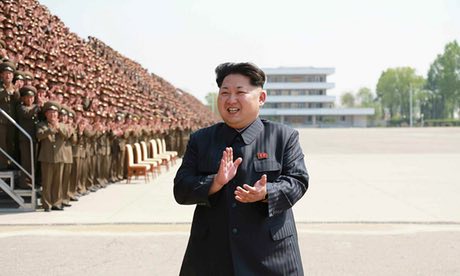Like most people who order assassins into a Malayasian airport to murder their half-brother with nerve agent, Kim Jong-un makes it difficult to examine his motivations with a sober head.
Historian Bruce Cumings attempts to do just that in an article in The Nation which explains the recent U.S. political bungling that allowed us to arrive at this scary precipice. There was a prime opportunity not even 20 years ago to have a nuke-free North Korea, but, alas, it was bungled by the Bush Administration. In the intervening period both sides of the aisle have ignored the meaning of this failure, exacerbating the situation.
Now America’s guided by a deeply ignorant, unbalanced President who’s managed after much effort to finally locate one murderous despot he despises. So it’s game on, but it’s the most dangerous game.
An excerpt:
As I wrote for this magazine in January 2016, the North Koreans must be astonished to discover that US leaders never seem to grasp the import of their history-related provocations. Even more infuriating is Washington’s implacable refusal ever to investigate our 72-year history of conflict with the North; all of our media appear to live in an eternal present, with each new crisis treated as sui generis. Visiting Seoul in March, Secretary of State Rex Tillerson asserted that North Korea has a history of violating one agreement after another; in fact, President Bill Clinton got it to freeze its plutonium production for eight years (1994–2002) and, in October 2000, had indirectly worked out a deal to buy all of its medium- and long-range missiles. Clinton also signed an agreement with Gen. Jo Myong-rok stating that henceforth, neither country would bear “hostile intent” toward the other.
The Bush administration promptly ignored both agreements and set out to destroy the 1994 freeze. Bush’s invasion of Iraq is rightly seen as a world-historical catastrophe, but next in line would be placing North Korea in his “axis of evil” and, in September 2002, announcing his “preemptive” doctrine directed at Iraq and North Korea, among others. The simple fact is that Pyongyang would have no nuclear weapons if Clinton’s agreements had been sustained.
Now comes Donald Trump, blasting into a Beltway milieu where, in recent months, a bipartisan consensus has emerged based on the false assumption that all previous attempts to rein in the North’s nuclear program have failed, so it may be time to use force—to destroy its missiles or topple the regime. …
A bigger lesson awaits Donald Trump, should he attack North Korea. It has the fourth-largest army in the world, as many as 200,000 highly trained special forces, 10,000 artillery pieces in the mountains north of Seoul, mobile missiles that can hit all American military bases in the region (there are hundreds), and nuclear weapons more than twice as powerful as the Hiroshima bomb (according to a new estimate in a highly detailed Times study by David Sanger and William Broad).•
Tags: Bruce Cumings, Donald Trump, Kim Jong-un

